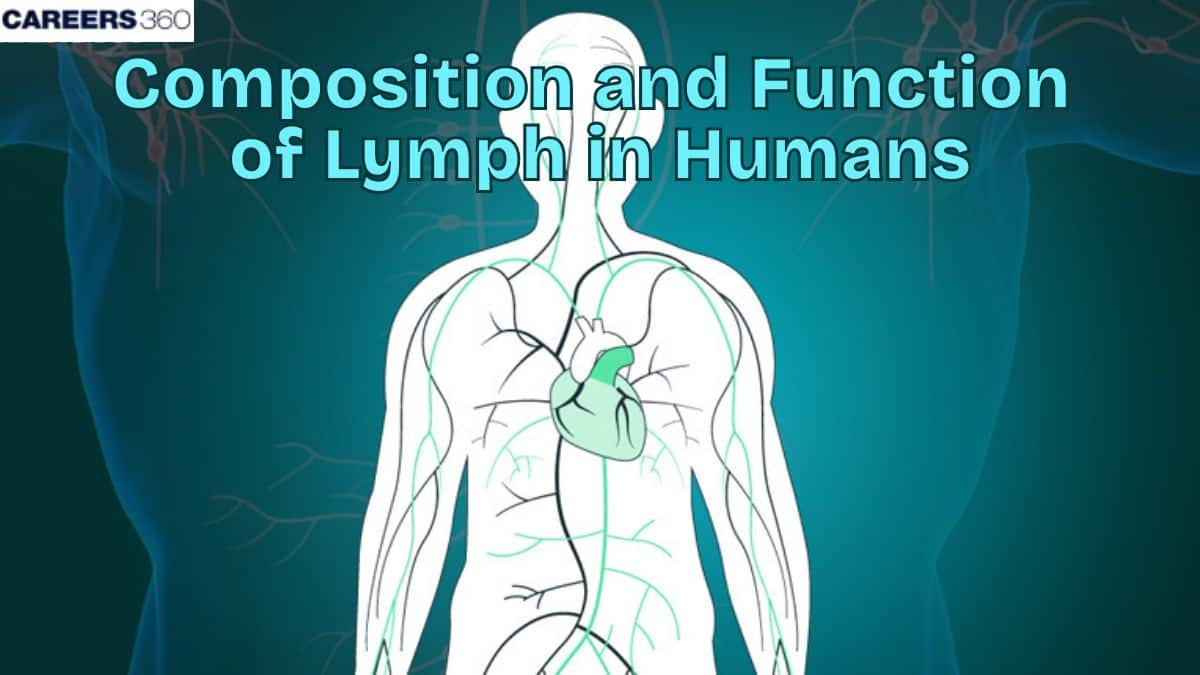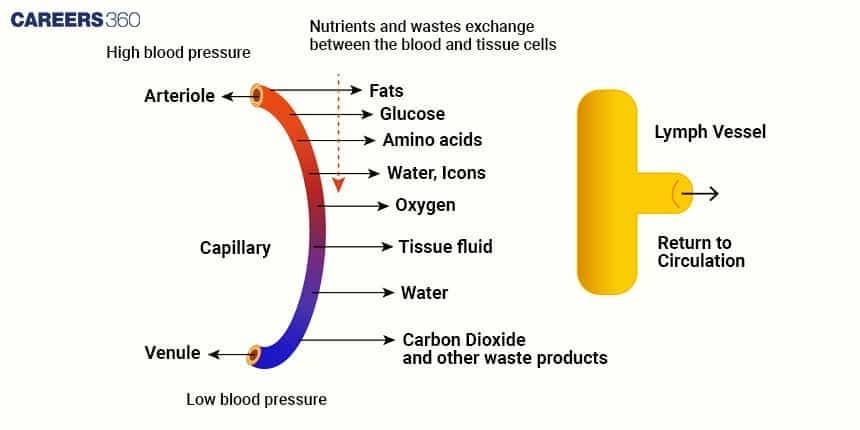Composition And Function Of Lymph In Humans
Lymph is a clear extracellular fluid circulating through the lymphatic system, filtering microbes, waste, and toxins. It maintains fluid balance, supports immunity, and transports nutrients, fats, and lymphocytes. This guide covers composition, formation, functions, lymphoid organs, diagrams, NEET notes, FAQs, and MCQs.
This Story also Contains
- What Is Lymph?
- Composition Of Lymph
- Formation Of Lymph
- Function Of Lymph
- Lymph NEET MCQs (With Answers & Explanations)

What Is Lymph?
Lymph is a clear or colourless fluid that flows through the lymphatic system. In essence, the lymphatic system acts as a filter against microbes, organic wastes, toxins, and other types of debris. It carries lymphocytes that move throughout the body fighting infections.
In animals and humans, the extracellular fluid, or the fluid outside the cell, is divided into interstitial fluid, or fluid existing between the tissues, and plasma.Plasma and interstitial fluid are similar due to continuous exchange across tissue capillary walls of small solutes, water, and ions. It does the following functions:
The delivery of nutrients to cells.
It enables intercellular communication between cells themselves.
Interstitial fluid removes metabolic waste products from cells.
The lymphatic system collects the interstitial fluid, and the rest is drained out. The drained fluid moves back to the blood vessels, and the remaining fluid is collected through the lymph capillaries, which are part of the lymphatic capillaries.
Composition Of Lymph
Lymphatic systems are formed by lymph plasma, lymph corpuscles, and lymphoid organs. The composition of the lymph is explained as follows:
Lymph Plasma
Lymph is interstitial fluid. It has a similar mineral content to plasma. This real antibody contains less calcium than plasma, fewer blood proteins, less phosphorus, and an increased concentration of glucose. Globulin proteins are present in the lymph plasma.
Other materials include organic and inorganic substances. It is through the lymph that the exchange between blood and tissue cells takes place in terms of gases and nutrients.
Lymph Corpuscles
These will include leucocytes, lymphocytes and amoeboid cells. It contains specialized lymphocytes which take part in inducing immune responses in the human body.
Lymphoid Organs
The lymphatic system comprises many lymph nodes deep within the body. The lymph nodes are linked with lymphatic vessels that circulate the lymph throughout the body. The lymph gets filtered at the lymph nodes. The spleen, tonsils, adenoids, and thymus make up part of the lymphatic system.
The spleen is regarded as the largest lymphatic organ in the system and is found under the ribcage, above the stomach and in the left upper quadrant of the abdomen. Other constituents of the lymphatic system – tonsils, adenoids, and thymus are found on either side of the throat and neck.
Other Components of Lymph
Carbohydrates
Lymphocytes
Creatinine
Water – 94%
Urea
Chlorides
Proteins – Albumin, globulin and fibrinogen
Non-protein nitrogenous substances
Formation Of Lymph
The formation of lymph is discussed below:
Capillary Filtration Process
Lymph is formed from interstitial fluid because the lymph vessel capillaries are permeable. When blood flows through blood capillaries in the tissues, 9/10ths of the fluid from the arterial end flows into the venous end of capillaries. The remaining one-tenth of the fluid then diffuses—in a pressure-driven process—into the very permeable lymph capillaries.
Role of Pressure & Capillary Permeability
Hence, when lymph flows through lymph capillaries, its composition, including its protein content, is more or less the same as that of the interstitial fluid. Since it is bigger than blood capillaries, proteins present in the interstitial fluid cannot diffuse into blood capillaries. Thus, they enter the lymph vessels which are freely permeable to large particles.
Lymph Rich in Proteins & Fats
More protein and lipid substances are present within tissue fluid from the liver and gastrointestinal tract. Hence, comparatively high amounts of proteins and lipids enter into the lymph vessels of the liver and gastrointestinal tract. As a result, lymph in larger vessels contains more proteins and lipids.
Function Of Lymph
Lymph performs some functions of paramount importance. A few major functions of lymph are mentioned below:
It helps to keep the body cells moist.
It transports oxygen, hormones, and nutrients to various parts of the body.
It carries metabolic waste produced by cells.
It carries antibodies and lymphocytes to the blood vessels.
The composition of tissue fluid and volume of blood is maintained by it
Absorption of fats from the small intestine occurs through lymphatic vessels.
Invasion of microbes and foreign substances is not allowed into the lymph nodes.
Lymph NEET MCQs (With Answers & Explanations)
Types of questions asked from this topic are:
Composition of lymph
Formation of lymph
Practice Questions for NEET
Q1. Which of the following statements are incorrect?
(i) Leucocytes disintegrate in spleen and liver.
(ii) RBCs, WBCs and blood platelets are produced by bone marrow.
(iii) Neutrophils bring about destruction and detoxification of toxins of protein origin.
(iv) Important function of lymphocytes is to produce antibodies.
(i) and (ii)
(i) and (v)
(i) and (iii)
(ii) and (iii)
Correct answer: 3) (i) and (iii)
Neutrophils are a type of white blood cell and the first line of defense in the immune system. They are highly phagocytic, meaning they engulf and destroy invading pathogens like bacteria and fungi. Neutrophils circulate in the bloodstream and rapidly migrate to infection sites, where they release enzymes and antimicrobial substances to eliminate threats.
Hence, the correct answer is option 3) (i) and (iii).
Q2. Which Plasma proteins are important for defense?
Fibrinogen
Albumin
Gamma globulins
α and β globulins
Correct answer: 3) Gamma globulins
Explanation:
Globulins are a category of proteins, that largely transport proteins of hormones, lipids, and minerals. Among them, the gamma globulins specifically have antibody functions taking part in an immunity defence mechanism against infections. Thus, such separation would mean the major roles of globulins in serving nutrient transport mechanisms as well as the immune system for health as well as protecting the body against diseases.
Hence the correct answer is option 3) Gamma Globulins.
Q3. Which of the following is/are a type of lymphocytes?
B-lymphocytes
S-lymphocytes
T-lymphocytes
Both 1 and 3
Correct answer: 4) Both 1 and 3
Explanation:
B-lymphocytes and T-lymphocytes.
Lymphocytes are a type of white blood cell that are crucial for the immune system helping the body fight infections and diseases.
Two essential elements of the immune system are T and B lymphocytes: T-lymphocytes contribute to cell-mediated immunity whereas B-lymphocytes are mainly engaged in the manufacture of antibodies.
Hence, the correct answer is option 4) Both 1 and 3.
Also Read:
Frequently Asked Questions (FAQs)
The lymphatic system circulates lymph containing white blood cells that fight infections throughout the body.
The lymphatic system includes all the lymphatic vessels and lymphoid organs including the lymph nodes, thymus, spleen, and lymphatic tissues like Peyer's patches and tonsils.
Lymph nodes are small, bean-shaped organs that extend the immune system by filtering the viruses, bacteria, and other causative agents of disease that circulate through the lymphatic system.
The lymphatic organs include the spleen, thymus, and tonsils.
The symptoms of a blocked lymphatic system include swelling, fatigue, bloating, depression, and excess weight gain.

